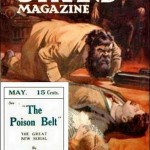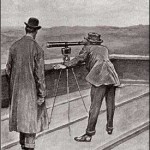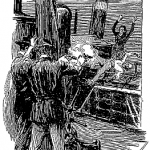And clank, clank went the chain again, and whir-r-r the engine, and up would come a pair of oil casks, as though the crane were some giant forceps which was plucking out the great wooden teeth of the vessel. It seemed to Tom, as he stood looking down, note-book in hand, that some of the actual malarious air of the coast had been carried home in the hold, so foul and close were the smells evolved from it. Great cockchafers crawled about over the packages, and occasionally a rat would scamper over the barrels, such a rat as is only to be found in ships which hail from the tropics. On one occasion too, as a tusk of ivory was being hoisted out, there was a sudden cry of alarm among the workers, and a long, yellow snake crawled out of the cavity of the trunk and writhed away into the darkness. It is no uncommon thing to find the deadly creatures hibernating in the hollow of the tusks until the cold English air arouses them from their torpor, to the cost occasionally of some unhappy stevedore or labourer.
All day Tom stood amid grease and steam, bustle and blasphemy, checking off the cargo, and looking to its conveyance to the warehouses. At one o’clock there was a break of an hour for dinner, and then the work went on until six, when all hands struck and went off to their homes or to the public-house according to inclination. Tom and the mate, both fairly tired by their day’s work, prepared to accept the captain’s invitation, and to meet him up in his quarters. The mate dived down into his cabin, and soon reappeared with his face shining and his long hair combed into some sort of order.
“I’ve been performing my ablutions,” he said, rolling out the last word with great emphasis and pomposity, for, like many Scotchmen, he had the greatest possible reverence for a sonorous polysyllable. Indeed, in McPherson, this national foible was pushed to excess, for, however inappropriate the word, he never hesitated to drag it into his conversation if he thought it would aid in the general effect.
“The captain,” he continued, “has been far from salubrious this voyage.
He’s aye complainin’ o’ his bodily infirmities.”
“Hypochondriacal, perhaps,” Tom remarked.
The Scotchman looked at his companion with a great accession of respect.
“My certie!” he cried. “That’s the best I’ve heard since a word that
Jimmy M’Gee, of the Corisco, said the voyage afore last. Would you
kindly arteeculate it again.”
“Hypochondriacal,” said Tom laughing heartily.
“Hypo-chon-driacal,” the mate repeated slowly. “I shouldn’t think Jimmy M’Gee kens that, or he’d ha’ communicated it to me. I shall certainly utilize it, and am obleeged to you for namin’ it.”
“Don’t mention it,” said Tom. “I’ll let you have as many long words as you like, if you are a collector of them. But what is the matter with the captain?”
“It’s aye the drink,” the mate said gravely. “I can tak’ my modicum mysel’ and enjoy it, but that’s no the same as for a man to lock himself up in his cabin, and drink rum steady on from four bells in the mornin’ watch to eight bells in the evenin’. And then the cussin’, and prayin’, and swearin’ as he sets up is just awfu’. It’s what might weel be described as pandemoniacal.”
“Is he often like that, then?” Tom asked.
“Often! Why, he’s never anything else, sir. And yet he’s a good seaman too, and however fu’ he may be, he keeps some form o’ reckoning, and never vera far oot either. He’s an ambeequosity to me, sir, for if I took a tithe o’ the amount I’d be clean daft.”
“He must be dangerous when he is like that?” Tom remarked.
“He is that. He emptied a sax-shooter down the deck last bout he had, and nigh perforated the carpenter. Another time he scoots after the cook—chased him with a handspike in his hand right up the rigging to the cross-trees. If the cook hadn’t slid down the backstay of the mast, he’d ha’ been obeetuarised.”
Tom could not refrain from laughing at the last expression. “That’s a new word,” he said.
“Ha!” his companion cried with great satisfaction, “it is, is it? Then we are quits now on the hypochondriacal.” He was so pleased that he chuckled to himself for some minutes in the depths of his tawny beard. “Yes,” he continued at last, “he is dangerous to us at times, and he is dangerous to you. This is atween oorsels, as man to man, and is said withoot prejudice, but he do go on when he is in they fits aboot the firm, and aboot insurances, and rotten ships, and ither such things, which is all vera well when sequestrated amang gentlemen like oorsels, but sounds awfu’ bad when it fa’s on the ignorant tympanums of common seamen.”
“It’s scandalous,” Tom said gravely, “that he should spread such reports about his employer. Our ships are old, and some of them, in my opinion, hardly safe, but that’s a very different thing from implying, as you hint, that Mr. Girdlestone wishes them to go down.”
“We’ll no argue aboot that,” said the canny Scot. “Muster Girdlestone kens on which side his bread is buttered. He may wish ’em to sink or he may wish ’em to swim. That’s no for us to judge. You’ll hear him speak o’t to-night as like as not, for he’s aye on it when he’s half over. Here we are, sir. The corner edifice wi’ the red blinds in the window.”
During this conversation the two had been threading their way through the intricate and dirty lanes which lead up from the water side to the outskirts of Stepney. It was quite dark by the time that they reached a long thoroughfare, lined by numerous shops, with great gas flares outside them. Many of these belonged to dealers in marine stores, and the numerous suits of oil-skin, hung up for exhibition, swung to and fro in the uncertain light, like rows of attenuated pirates. At every corner was a great public-house with glittering windows, and a crowd of slatternly women and jersey-clad men elbowing each other at the door. At the largest and most imposing of these gin-palaces the mate and Dimsdale now pulled up.




